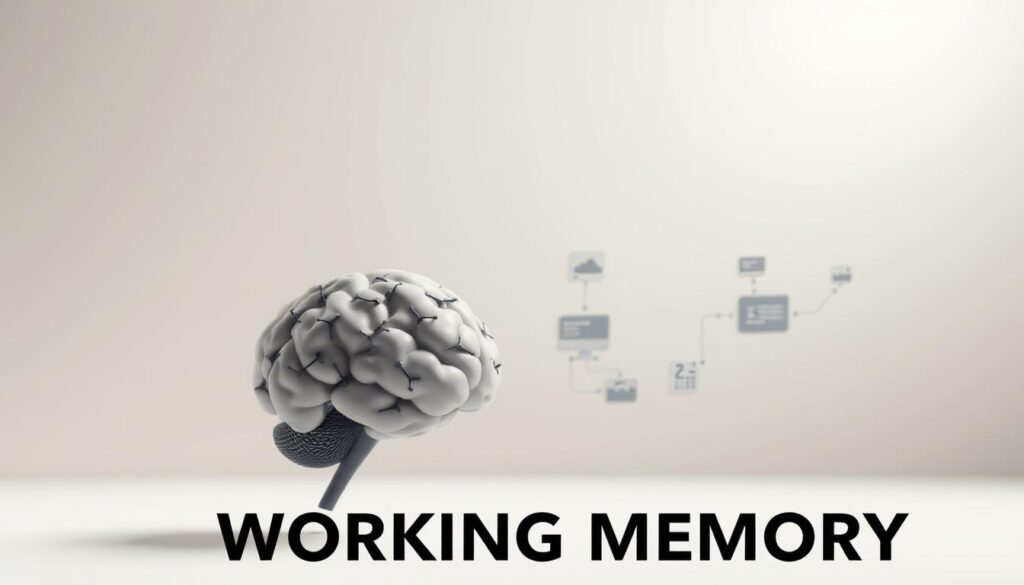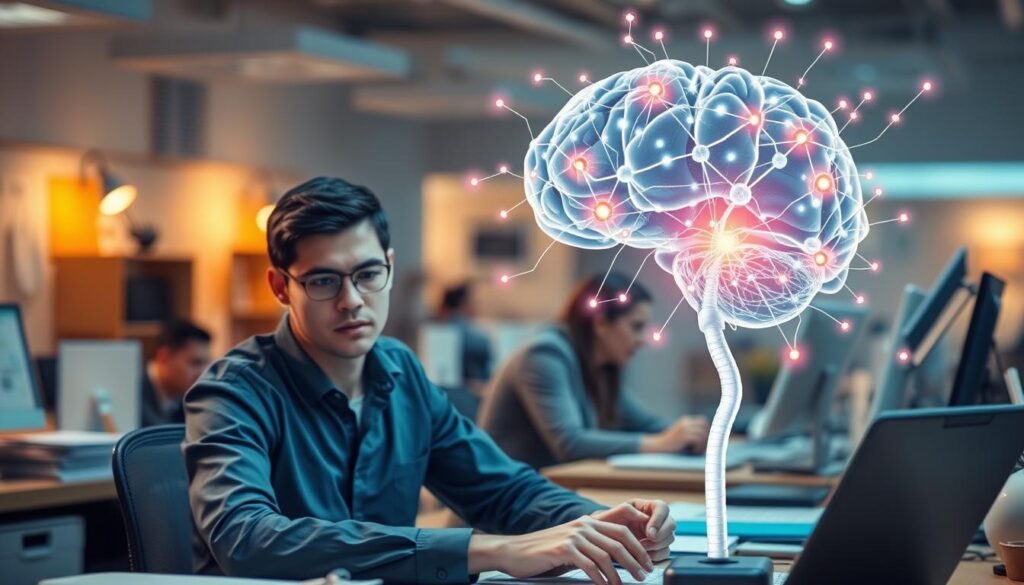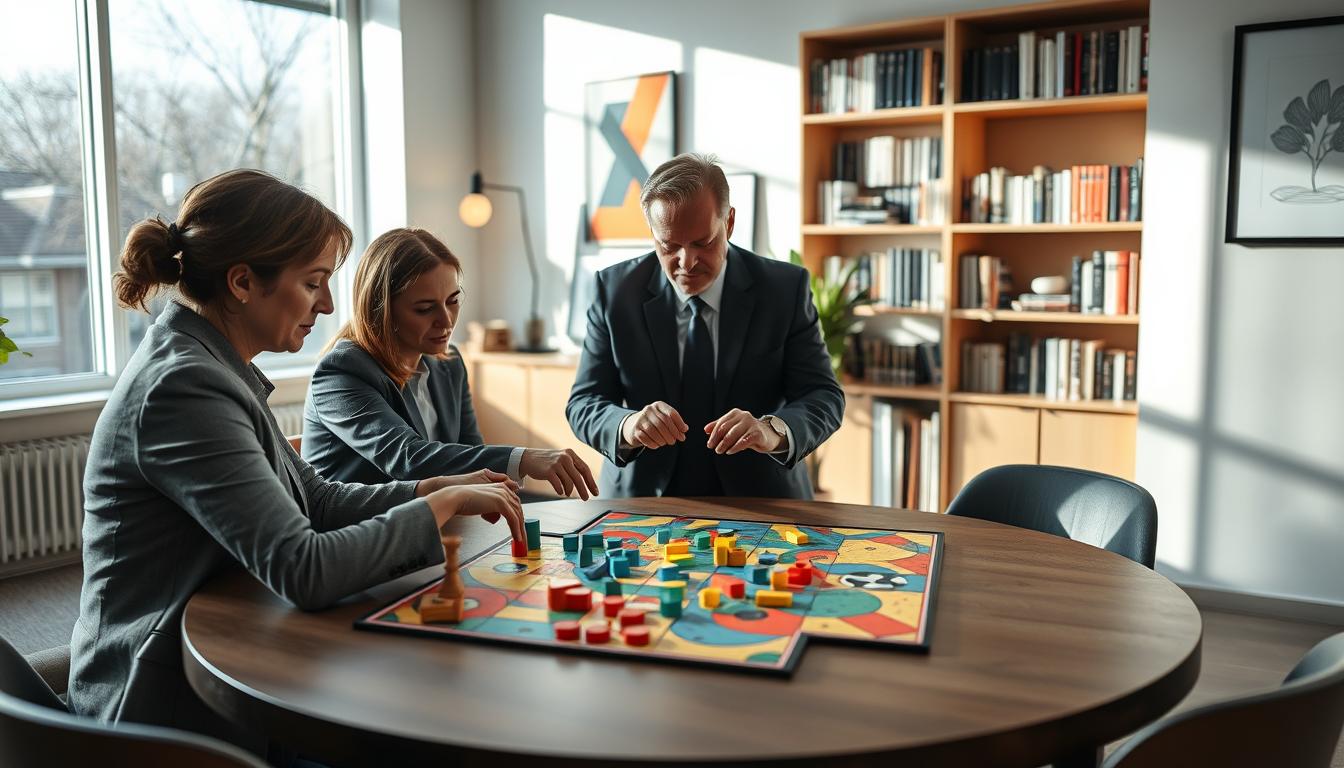Educational games to improve working memory in multitasking adults
Ever wondered why some adults can handle many tasks at once while others find it hard? It often comes down to their working memory. This part of the brain is key for multitasking. Educational games are great for improving working memory, making the brain work harder and smarter.
By playing brain games every day, people who multitask can get better at remembering things. This makes them more mentally sharp. Let’s dive into how these games can change how we handle daily tasks.
Understanding Working Memory
Working memory is a key part of our brain that holds information temporarily. It helps us do tasks by managing info in our mind. Knowing what working memory is helps us see its importance in our daily lives.
It has parts like the central executive, which controls our focus. There’s also the phonological loop and the visuospatial sketchpad. These parts help us keep verbal and visual info. They help us solve problems and make decisions.
Studies show working memory affects how well we remember things and learn new stuff. Having a strong working memory makes it easier to handle complex tasks. So, understanding it is crucial for reaching our full potential.

Importance of Working Memory in Adults
Working memory is key for adults to think clearly and do daily tasks well. It helps us hold and use information quickly. This skill is needed for reading, writing, and solving problems.
People with good working memory do well in school and stay mentally sharp. They can handle complex tasks and think critically. This skill is also important for work, where we often have to do many things at once.

Signs of Weak Working Memory
Spotting the indicators of weak memory is key to tackling problems. Adults often misplace things or have trouble keeping track of their belongings. They might also find it hard to follow instructions, leading to misunderstandings or unfinished tasks.
Recalling important information can be tough, affecting both personal and work life. This can make everyday tasks harder. It’s important to recognize these signs to work on improving memory.
Brain training and memory games can help. They can ease symptoms and boost memory. This can lead to less stress and better performance at work or school.
| Signs | Description |
|---|---|
| Misplacing Items | Frequent loss of everyday objects. |
| Following Instructions | Difficulty completing tasks as directed. |
| Information Recall | Inability to remember recent discussions or details. |
| Re-reading Texts | Need to read the same material several times to grasp it. |
| Decreased Productivity | Notable drop in work output or efficiency. |
Impact of Multitasking on Memory
Multitasking can really hurt your memory, mainly because it makes your brain work too hard. Trying to do many things at once can confuse your brain. Studies show that multitasking can make your working memory worse, leading to more mistakes and less understanding.
When you’re doing many things at once, your brain finds it hard to focus on one thing. This can mess up your thinking and make it tough to remember things later. Research from the University of Sussex found that multitasking can even change your brain’s structure. This can make it harder to remember things, showing why training your brain is key.
Benefits of Educational Games
Educational games are key for boosting adult brain power, especially in working memory. They make learning fun by improving brain skills. Studies show they help keep memory sharp and boost mental quickness.
Games do more than just entertain. They help people improve their thinking skills. Playing games regularly makes you better at solving problems and staying focused. It also helps your brain connect better, which is good for your mind.
Playing games regularly makes your brain faster and more flexible. Adding games to your daily routine is a smart way to keep your mind sharp. They’re a fun way to improve your brain, making your thinking more balanced and sharp.
| Benefit | Description |
|---|---|
| Cognitive Enhancement | Improves overall brain functions and memory retention. |
| Problem-Solving Skills | Encourages critical thinking and quick decision-making. |
| Mental Agility | Enhances speed of thought and adaptability in various situations. |
| Neural Connectivity | Strengthens connections between neurons, supporting better memory. |
| Creativity Boost | Stimulates imaginative thinking and innovative ideas. |
Types of Games to Enhance Memory Skills
Playing games that boost memory can really help your brain. Different games offer different levels of challenge. Board games and card games are especially good for improving memory.
Board Games
Games like chess and Scrabble are fun and help you think strategically. You need to remember moves and rules and adjust your plans. This helps your brain stay flexible and focused.
Playing with others also adds mental fun. You get to talk and share ideas, making the game even more engaging.
Card Games
Games like Uno and Rook challenge your memory in unique ways. You have to keep track of your cards and guess what others will play. This improves your ability to multitask and stay alert.
These games also make you think fast and keep up with the game’s pace. This helps your brain work better and remember things longer.
Brain Games for Working Memory Improvement
Playing brain games can really help improve working memory. It makes learning fun and boosts your brain power. Games that focus on puzzles and memory are especially good. They work on different parts of your brain and help you remember better.
Puzzles and Spatial Games
Puzzles are great for your brain. They keep you focused on patterns and shapes. Jigsaw puzzles, for example, make you think about space and strategy.
They improve your memory and spatial skills. Playing these puzzles makes your brain more flexible and better at remembering things.
Memory-Based Activities
Games like card matching or apps like Lumosity are great for your brain. They help you remember things quickly and efficiently. Every time you play, you get better at remembering.
Studies show that playing these games regularly can really improve your working memory. They’re a fun and effective way to train your brain.
Integrating Games into Daily Routine
Adding educational games to your daily routine is key for better memory. Adults should set aside time for brain exercises. This can be during morning coffee or evening relaxation.
Using reminders on digital devices helps make game time a habit. Playing with family or friends boosts motivation and cognitive benefits. Studies show that regular brain games improve memory and focus over time.
Additional Strategies to Enhance Working Memory
To improve working memory, try different strategies. Mindfulness practices can boost focus and attention. This helps keep information in mind better. Meditation and focused breathing exercises also reduce mental stress, making it easier to handle tasks.
Mindfulness and Focus Techniques
Mindfulness can greatly improve your thinking skills. Activities like mindful breathing or body scans clear your mind. They make it easier to process information. These strategies work well with educational games, making learning fun and effective.
Physical Activities
Physical activities do more than keep you healthy. Exercises like tai chi, yoga, or aerobics improve brain connections and thinking speed. They support working memory strategies, offering a complete approach to better memory.
Regular exercise strengthens your body and brain. It boosts memory and thinking skills. This makes cognitive training even more effective.
Choosing the Right Games
Choosing the right games is key to improving working memory. It’s about finding brain training options that test memory and thinking skills. Look for effective memory games that match your interests and skills. This makes practice more fun and keeps you coming back.
It’s important to consider the speed and complexity of games. New app-based games that change with your progress are popular. But don’t forget traditional games that have proven to be effective too.
The best games challenge you and keep you wanting to play more. Enjoying the games is crucial for lasting benefits. It helps make memory improvement strategies more effective.
Conclusion
Educational games are a great way to improve working memory in adults who multitask a lot. These games make learning fun and help grow our brains. By playing brain games every day, we can get better at handling tasks and do our jobs and personal tasks better.
Working memory is key to keeping our brains sharp. Games are a big help in keeping our minds active. Adding mindfulness and exercise to our routine can make our brains even stronger.
Using educational games is a smart way to keep our brains healthy. It helps us deal with complex tasks and keeps our minds sharp for life. This approach gives us the skills we need to handle many tasks at once and keeps our brains in top shape.
FAQ
What is working memory?
Working memory is a part of our brain that holds information temporarily. It helps us manage and use this information for tasks. This makes it easier to make decisions and solve problems.
Why is working memory important for adults?
Working memory is key for daily tasks like reading and planning. It helps with learning and thinking clearly. This is especially true when we have to handle many tasks at once.
What are signs of weak working memory?
Weak working memory might show up as losing things often or having trouble following directions. It can also make it hard to remember information. Adults might find it tough to keep up with conversations or need to read things over and over.
How does multitasking affect working memory?
Multitasking can hurt working memory by making it hard to keep track of things. This leads to forgetting information and making mistakes. Trying to do too many things at once can make it hard to focus.
How can educational games improve working memory?
Educational games are fun ways to challenge your brain. They help improve memory and problem-solving skills. Playing these games regularly can make your brain stronger.
What types of games effectively enhance memory skills?
Games like chess and Scrabble, and card games like Uno, are great for memory. They help you think strategically and handle many tasks at once. This makes your brain more flexible.
What are some brain games designed specifically for working memory improvement?
Games like puzzles and card matching are made to improve working memory. They help you remember things better and solve problems quickly. This makes your brain work better overall.
How can adults integrate educational games into their daily routines?
Adults can play educational games during breaks or free time. Setting reminders and playing with friends or family can make it more fun. This helps you stay consistent.
What additional strategies can complement working memory enhancement?
Activities like meditation and exercise can also help. They improve focus and reduce stress. Exercise is especially good for your brain and helps with memory.
How do I choose the right games for improving working memory?
Look for games that challenge your memory and attention. Choose games that fit your needs and are fun. This will help you keep playing and improving your memory.














